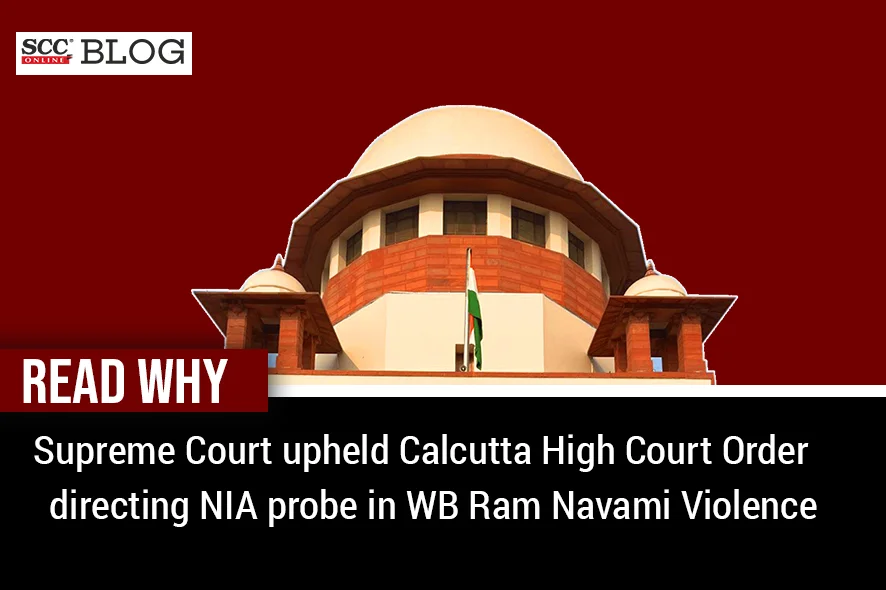Supreme Court: In a special leave petition filed by the State challenging an order of the Calcutta High Court, wherein the Court transferred the entire investigation relating to West Bengal Ram Navami Violence to the National Investigation Agency (‘NIA’) with a direction to the Central Government to exercise their power under Section 6(5) of the National Investigating Agency Act 2008, the Full bench of Dr DY Chandrachud*, CJI., J B Pardiwala and Manoj Misra, JJ. has upheld the impugned order.
Background
The present matter is regarding the violence that occurred between two groups when a Ram Navami procession was taken out in West Bengal.
Acting on a Public Interest Litigation filed by Member of Legislative Assembly and West Bengal opposition leader Suvendhu Adhikari, the Calcutta High Court held that the allegations implicate offences punishable under the Explosive Substances Act. Hence, this is a fit case where the entire investigation should be transferred to the National Investigation Agency (‘NIA’) with a direction to the Central Government to exercise their power under Section 6(5) of the National Investigating Agency Act 2008. Thus, the Court directed the State police to ensure that all the FIRs, documents, material seized and CCTV footage, among other things, should be immediately handed over to the NIA which shall commence investigation and proceed in accordance with law.
Submission
The State submitted that the police authorities in West Bengal have duly acted in pursuance of the alleged incidents which took place during the Ram Navami observances in the State; and the direction by the High Court for the transfer of investigation to the NIA is not warranted and would demoralise the police in conducting investigation in accordance with law.
Analysis
After perusing Sections 6(1) and 6(5), the Court noted that Section 6(1) of NIA Act provides that the police officer is required to inform the State Government about any scheduled offence and thereafter , the State Government has to forward such information to the Central Government. However , the power of the Central Government to refer the investigation to NIA is not constrained by the State Government’s report. Further, it said that the Central Government, in terms of its mandate, has to apply its mind to whether firstly, the offence is a scheduled offence or not; and secondly, whether having regard to the gravity of the offence and other relevant factors, it is a fit case to be investigated by the NIA.
The Court noted that after the impugned order was passed, the Central Government issued a notification in exercise of its power under Section 6(5) NIA Act, 2008. The notification which has been issued by the Central Government refers to the High Court’s order, but it proceeds to expressly clarify that the power was also being exercised in terms of the provisions of Section 6(5). Thereafter, six FIRs were registered, and cognizance has been taken by the Special Court. Thus, NIA has exercised its jurisdiction specifically with reference to its powers under Section 6(5).
As per the Court, at this stage, the Court was not called upon to either decide on the sufficiency of the allegations or their veracity. The sphere of this Court would be to determine whether the exercise of jurisdiction by the Central Government under Section 6(5) is extraneous to the powers conferred upon it by Section 6(5) to warrant the interference of this Court. The precise contours of the investigation which should be carried out by the NIA cannot be anticipated or restricted at this stage. Further, cognizance has also been taken by the NIA Court.
Thus, as there is no challenge to the validity of the notification which was issued under Section 6(5), the Court refused to entertain the special leave petition.
Further, it clarified that the observations which were made by the High Court in the impugned order would be confined to the question as to whether the exercise of jurisdiction by the NIA under the National Investigation Agency Act, 2008 is valid. Thus, the Bench affirmed the judgment of the High Court.
[State of West Bengal v. Suvendu Adhikari, 2023 SCC OnLine SC 879, decided on 24-07-2023]
*Judgment Authored by: Justice Dr. D.Y. Chandrachud
Advocates who appeared in this case :
For Petitioner: Senior Advocate Dr. Abhishek Manu Singhvi, Senior Advocate Gopal Shankarnarayan, Advocate Sanjay Basu, Advocate Amit Bhandari, Advocate Nipun Saxena, Advocate Srisatya Mohanty, Advocate Aditi Gupta, Advocate Anju Thomas, Advocate Sanjeev Kaushik, Advocate Mantika Haryani, Advocate Shreyas Awasthi, Advocate Himanshu Chakravarty, Advocate Ripul Swati Kumari, Advocate Bhanu Mishra, Advocate Muskan Surana, Advocate Saransh Bhardwaj, Advocate Archit Adlakha, Advocate Soumya Saxena, Advocate Aditya Raj Pandey, Advocate-On-Record Astha Sharma;
For Respondent: Advocate-On-Record Pranab Prakash, Advocate Abhishek Sarkar, Senior Advocate P.S.Patwalia, Advocate Bansuri Swaraj, Advocate Siddhesh Kotwal, Advocate Ana Upadhyay, Advocate Manya Hasija, Advocate Nihar Dharmadhikari, Advocate Tejasvi Gupta, Advocate Mahamaya Chatterjee, Advocate Lokenath Chatterjee, Advocate Rahul Sharma, Advocate Nirnimesh Dube, Solicitor General Tushar Mehta, Advocate Kanu Agarwal, Advocate Anmol Chandan, Advocate Ashok Panigrahi, Advocate Sansriti Pathak, Advocate-On-Record Arvind Kumar Sharma, Senior Advocate P.S. Patwalia.






